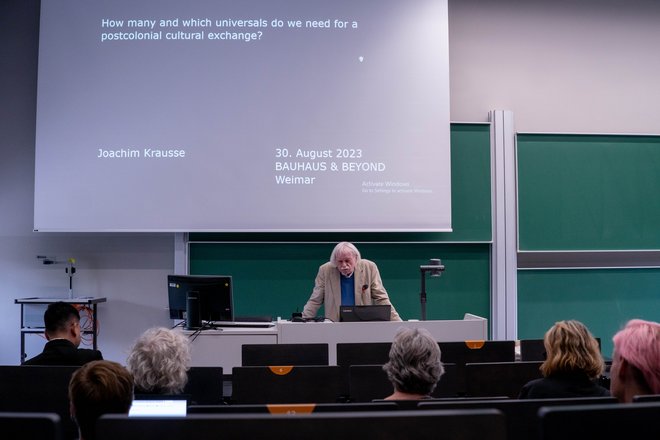
"How many and which universals do we need for a postcolonial cultural exchange?" by Joachim Krausse
Klicken Sie auf den Play-Button, um externe Inhalte von Vimeo.com zu laden und anzuzeigen.
Externe Inhalte von Vimeo.com zukünftig automatisch laden und anzeigen (Sie können diese Einstellung jederzeit über unsere »Datenschutzerklärung« ändern.)
- 16:30 - 17:30 - "How many and which universals do we need for a postcolonial cultural exchange?" by Joachim Krausse, Berlin.
This seminar-workshop is designed in a conversation format and calls for exploration of the question/statement - how many and which universals do we need for a postcolonial cultural exchange? Which will be followed by a dialogical structure to discourse. Cultural Exchange seems to be the essence of our teaching and learning in the International Master Programs in Architecture and Design. This exchange of cultural traditions and attitudes in the designing professions presupposes neutral and universal standards of communication. These are technical, like numerical systems or the binary code, as well as non-technical means of exchange like music or coloring. Yet, in the predominant tool of understanding, we are dependent on a lingua franca in the scientific discourse. This is currently the general use of the English language, which itself is contaminated by its rule in the colonial power structure of the British Empire. From antiquity through the Middle Ages the scholars preferred for their mutual understanding a dead language, Latin. This was the first attempt at a true postcolonial practice in scientific exchange. The price for this successful practice was exclusivity. If we now have to work out guidelines for postcolonial cultural exchange, we could learn of the process of establishing universal standards beyond power play. Good examples of this are to be found in the revolution of general accounting by the wandering of the concept of zero from east to west along the Silk Road and the introduction of the cipher into the general accounting system. This was an achievement of intercultural exchange by translation on a global scale without any colonial shadow.

